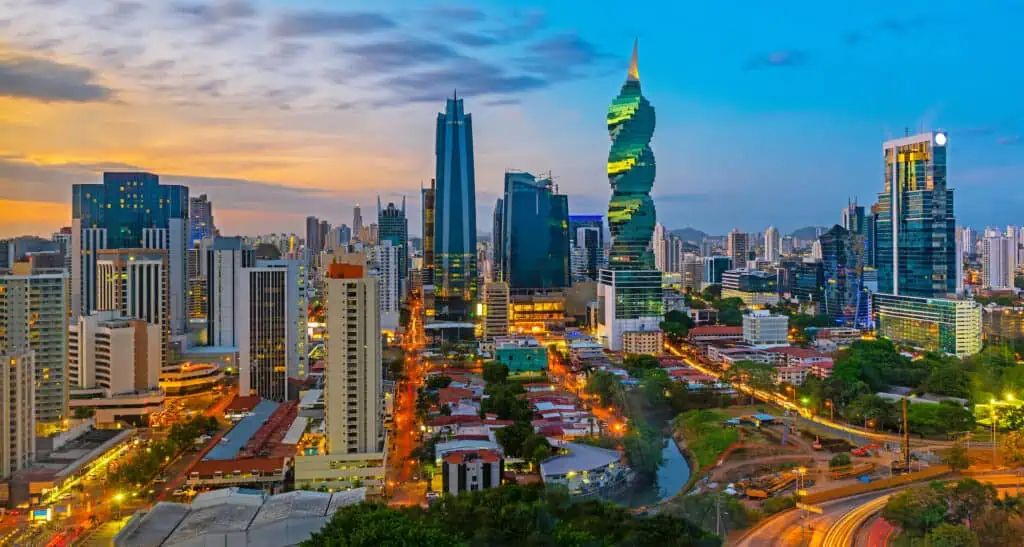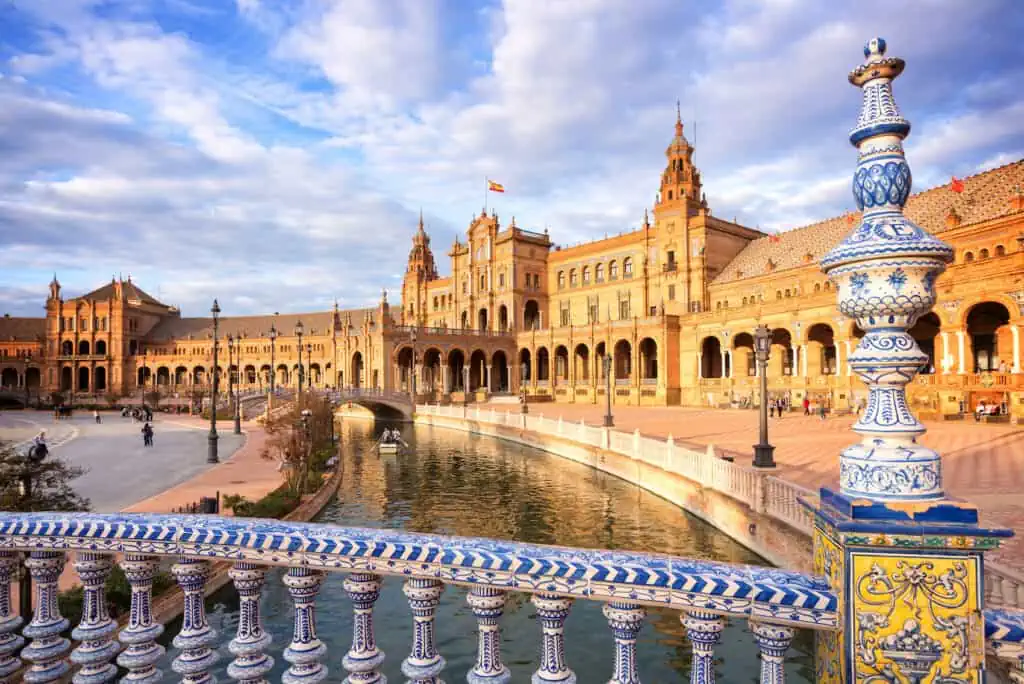How To Retire Abroad as an Expat
Posted in: I'm Moving, International Moving, Moving AdviceHave you ever dreamed of retiring in a beautiful, exotic location, where the weather is warm, the scenery is breathtaking, and the cost of living is low?
If so, you’re not alone. Millions of Americans have chosen to retire abroad as expats in pursuit of a better quality of life. However, retiring abroad can be a complex and challenging process. There are many factors to consider, such as finances, housing, visas and permits, and international moving.
But don’t worry: we’ve broken down everything you should know about how to retire abroad as an expat, including the benefits of retiring abroad, the most popular and expat-friendly places to retire, how to plan your retirement abroad, tips for financial preparation, finding housing, and managing logistics.
Benefits of Retiring Abroad
There are a lot of reasons why people choose to retire overseas. For one, it can provide an improved lifestyle, with the potential to enjoy warm climates and a more relaxed pace of life. There’s also plenty of opportunity for adventure! Whether you choose popular destinations like Spain or Mexico, or opt for somewhere a bit more off the beaten path like Belize or Thailand, exploring your new surroundings will keep your retirement years exciting and full of new experiences.
And on top of that, one of the biggest advantages of retiring abroad is the ability to live on less and make your retirement savings go much further. In fact, there can be several financial benefits, including:
- Lower cost of living: Many countries offer a lower cost of living in general than in the United States, which means retirees can live a comfortable lifestyle without having to spend as much money. In fact, there are many safe cities where it’s possible to live on less than $2,000 per month.
- Lower healthcare costs: Healthcare costs in many countries are lower than in the U.S. Some of these countries with lower healthcare costs include Brazil, Singapore, Panama, and Malaysia. In many countries, it’s even possible to buy private coverage for significantly less than you would pay here.
- Tax benefits: Some countries offer tax benefits for retirees, including reduced or waived taxes on retirement income. Nicaragua, for instance, allows retiree residents to bring $20,000 of personal goods in once, duty-free, as well as bring $50,000 of building materials for a house or business and not pay sales tax.
- Affordable housing: In most countries, rental prices, homes, and property taxes are more affordable than in the U.S.
Popular and Expat-Friendly Places To Retire Abroad
There are several countries all around the world that make attractive destinations for retirement. The best places have welcoming cultures, low cost of living, and many other benefits that make them ideal places to retire.
Mexico
Pro: Mexico offers all the benefits of retiring abroad while being right next door to the U.S., making it easy to visit friends and family.
Mexico offers retirees plenty of activities to keep busy with its beautiful beaches, vibrant culture, and friendly people. Retirees can take advantage of Mexico’s superb healthcare services, including access to U.S.-based medical facilities, making it an alluring choice for Americans seeking a new home that’s not too far away. Its tropical climate also makes it an excellent place to live year-round.
Costa Rica
Pro: Costa Rica’s healthcare system is widely regarded as the best in Latin America.
Costa Rica is another great destination for retirees due to its stunning landscapes, unique wildlife, and outdoor experiences like zip lining through the jungle canopy or whale watching off the coast. The country boasts a stable political environment and is known for being a peaceful country, which can provide retirees with a sense of security and safety. Costa Ricans (called Ticos) are known for being friendly and welcoming to foreigners: Costa Rica also offers a special retirement program called “Pensionado” which provides a number of benefits to foreign retirees, including discounts on goods and services, import tax exemptions, and more.
Panama
Pro: Panama has one of the most comprehensive retiree programs for expats in the world, known as the Pensionado Visa.
Panama is another top choice when it comes to retiring abroad. Aside from the great weather and culture, Panama has a territorial tax system, which means income earned outside of the country is not subject to Panamanian income tax. This can be advantageous for retirees who rely on retirement income from pensions, investments, or other sources that are held in the U.S. Not to mention, Panama has a well-developed infrastructure, including modern roads, reliable utilities, and high-speed internet access. Plus, it’s relatively close to the United States, with direct flights to several U.S. cities, making it easier for retirees to visit family and friends back home.
Spain
Pro: The largest country in Southern Europe, Spain offers European sophistication and first-world infrastructure at an affordable cost.
If you’re willing to relocate a bit further, Spain is another popular retirement destination. Spain has a vibrant cultural and social scene, and there are plenty of expat groups catering to retirees. Spanish cuisine is world-renowned, and you can enjoy local markets, tapas bars, and fine dining establishments. The cost of living in Spain is also generally lower than in many Western European countries and the United States.
Thailand
Pro: Thailand’s cost of living is one of the best you’ll find; a couple can live comfortably for about $1,700 per month.
It’s not just Spanish-speaking countries that make great expat retirement destinations. You can find an amazing home on the other side of the globe in countries such as Thailand. Here, there’s a well-established expat community, particularly in popular destinations like Bangkok, Chiang Mai, and Phuket, which can help you connect with others and build a social support network.
But Thai people are also known for their friendliness and hospitality. Additionally, Thailand’s location in Southeast Asia also makes it an excellent base for exploring neighboring countries like Cambodia, Laos, Myanmar, Vietnam, and Malaysia.
Of course, the world is your oyster, and these are just a few popular destinations. There are pros and cons to retiring in any country, so choose a location that fits your ideal lifestyle.
How To Plan Your Expat Retirement
Financial Preparation
Retiring abroad can offer many financial advantages — namely, a lower cost of living. But that doesn’t mean moving overseas will always save you money. You still need proper planning to ensure your expat retirement is financially beneficial and sustainable.
There are several one-time and ongoing expenses you’ll need to plan for before moving, including:
- Visa and immigration fees, which are around $100 or less for many countries
- Travel expenses, including flights, ground transportation, excess baggage fees, travel insurance, and temporary accommodations
- Shipping and storage, including customs fees, taxes, and insurance
- Costs of settling in, such as setting up utilities, buying new appliances, or purchasing new clothes suitable for the local climate
- Living expenses, including rent or mortgage payments, security deposits, home furnishings, etc.
- Health insurance and medical expenses
- Local transportation, whether you plan to use public transportation or buy a car
- Expenses related to staying connected, such as mobile phone plans, internet access, and postage for mailing packages or letters
- Entertainment, including exploring your new surroundings, dining out, attending events, and enjoying local attractions
Apply for senior discounts
Fortunately, there are some ways to cut the cost of some of these items. Many airlines, hotels, and shipping companies offer discounts to students, military personnel, or seniors.
Many countries also have their own senior discount programs. In Costa Rica, for example, residents over age 65 can take advantage of the “gold citizens” program that provides discounts on groceries, eyeglasses, clothing, transportation, and more, with thousands of participating retailers across the country. Panama has a similar program called “Pensionado,” which offers substantial discounts such as 25% off utility bills, 15% off dental exams, 30% off transportation services, and much more. You can see the whole list here.
“The online travel community often recommends allocating $5,000 to $8,000 per person as a starting budget [for moving abroad].”
You should also compare plans between service providers and negotiate the lowest rates possible. Locals and expats can also offer valuable advice on cost-saving strategies, affordable housing, and other resources.
Set up a new bank account
In addition to the expenses above, you’ll also need to plan for costs associated with getting your finances set up in a new country. For example, you might need to pay fees to open bank accounts or transfer money overseas.
Find out the exchange rate
Also take into consideration the exchange rate and how it might affect the value of your money. An exchange rate is the value of one country’s currency expressed in terms of another country’s currency. In other words, it is the rate at which one currency can be exchanged for another. For example, if the EUR/USD exchange rate is 1.20, it means that you need 1.20 U.S. dollars to buy one euro.
Calculate your tax difference
It’s important to plan for taxes as well. Each country has its own tax laws, which may be different from what you’re used to back home. In particular, consider how taxation will affect any income or investments you earned in the U.S. versus while living abroad. HSBC offers several tax guides for popular countries and regions. When in doubt, it’s a good idea to consult with a tax professional, which can save you money in the long run.
Get a feel for the cost of living
Remember that the cost of living can vary significantly from one country to another, so research your destination to better understand what costs are like. You can also reach out to expat online communities and forums, as well as subscribe to expat blogs for first-hand advice on managing expenses when moving overseas.
Should You Rent or Buy?
Finding the right housing when retiring abroad is one of the most important steps in your relocation process. Whether you choose to rent or buy, it’s essential to understand what options are available and how they fit into your budget.
Renting
Renting can be a good way to transition to living in a new location without fully committing right away. You can give yourself time to get acquainted with the region and decide if you really want to stay for the long haul.
If you go this route, be sure you fully understand all rental agreements before signing them, including any additional fees you may be responsible for. Also, be aware of the landlord-tenant regulations in your new country so that you can avoid any potential conflicts. And importantly, never sign a lease sight unseen. It might require extra trips back and forth, but you should always view a property (and the surrounding neighborhood) in person before making a deal.
See prices for local moving labor. Read real customer reviews. Easily book your help online.
Buying
Alternatively, buying property overseas can provide stability and security. But it comes with its own set of considerations. Researching local real estate markets is essential; this includes looking at property prices, taxes, insurance costs, etc., as well as researching legal requirements for foreign buyers in the target country. In fact, it may be worth hiring a local attorney to review any contracts or financing agreements before committing.
“Look for [moving] companies with experience, positive reviews, and affiliations with professional organizations like the International Association of Movers (IAM) or FIDI Global Alliance.”
When it comes time to find properties, you can start by browsing online property listing websites like Zillow, which have filters for location, price, and property features. You can also try sites such as Sabbatical Homes, Expatica.com, and Sublet.com. These websites can provide a good starting point for your search, but it also helps to work with a local real estate agent who knows what properties are on the market that will meet your needs, and that may not be listed on major sites.
Getting a Visa
One of the most important steps when preparing to retire abroad is finding out what residency permits or visas are needed to live in your desired location. There are many types, depending on the reason for moving and how long you plan to stay. For instance, you might qualify for a family visa if you’re reuniting with a loved one overseas, or a spouse visa if your partner resides abroad. In general, it’s more expensive and involved to establish permanent residency than to get a temporary or tourist visa.
The steps for obtaining a visa to retire abroad can vary depending on the country you plan to retire in. However, here are some general steps that you can follow:
- Check the visa requirements: Some countries may have a retirement visa program, while others may require you to apply for a regular tourist visa or a long-term residence permit. Start by visiting the official government website of the country you wish to move to — most countries have an immigration department dedicated to providing information about visas. You can also consult with the U.S. embassy, which should be able to provide you with application guidance and documentation requirements. Again, expat blogs and forums are another good place to get insider information. Keep in mind these can be helpful for getting a general understanding of the options available, but always verify information with official sources, as rules and regulations may change.
- Gather the required documents: You will need to gather the required documents such as your passport, proof of income or savings, medical insurance, police clearance certificate, and other documents that the country may require.
- Apply for the visa: You can apply for the visa at the nearest embassy or consulate of the country you plan to retire. Some countries may allow you to apply online or by mail.
- Attend an interview (if required): Some countries may require you to attend an interview before they grant you the visa.
- Wait for the visa to be processed: The visa processing time can vary depending on the country and the type of visa you are applying for. It’s important to apply for the visa well in advance of your planned departure date to give enough time for everything to be verified and approved.
It’s important to note that the process of obtaining a retirement visa can be complex. If you’re unsure about the process or have a unique situation, consider consulting an immigration lawyer who specializes in the country you’re moving to. They can provide expert advice and help you navigate the application process.
See prices for local moving labor. Read real customer reviews. Easily book your help online.
What about citizenship?
Some countries may also provide the opportunity for foreign individuals to become citizens after a certain amount of time spent living there. You may want to consider applying since it brings many advantages.
For instance, you may gain the right to vote and participate in the political process, which can be especially important if you’re looking to influence policies and decisions that affect your life abroad. Holding a passport from a country with strong international relations can also grant visa-free or visa-on-arrival access to a larger number of countries, making travel easier and more convenient. Plus, you may be able to access programs that provide better healthcare, higher education, and government support.
“Healthcare costs in many countries are lower than in the U.S. Some of these countries with lower healthcare costs include Brazil, Singapore, Panama, and Malaysia.”
Another logistical consideration is getting yourself assimilated into the new culture. For example, you probably want to learn the local language so you can more easily communicate and navigate the country. It can be a good idea to take classes or sign up for an online language learning program before moving.
How To Move Internationally
Finally, you’ll need to plan out the actual process of moving. As you might imagine, relocating overseas is a bit more complex than moving to an apartment the next town over.
- Hire a reputable moving company: They’re responsible for getting your belongings to your destination in one piece, so finding and hiring a professional, responsible company is key. Begin by researching reputable international moving companies that specialize in overseas moves. Look for companies with experience, positive reviews, and affiliations with professional organizations like the International Association of Movers (IAM) or FIDI Global Alliance.
- Contact the companies for quotes: Be sure to provide them with accurate information about your belongings, destination, and desired timeline. Make sure quotes include all the services you think you need, such as packing, loading, transportation, insurance, customs clearance, and delivery. Contacting three companies at a minimum will help you get a good spread of options.
- Confirm the details of your move: Once you’ve chosen a moving company, give them the information about pick-up and delivery dates, packing and unpacking services, and insurance coverage.
- Ensure your move is protected: Get a written contract that outlines all the agreed-upon terms. Since international moves can be riskier than domestic moves due to the longer distances and multiple handling stages, you may want to consider purchasing additional insurance coverage to protect your belongings against potential damage or loss during transit.
- Budget for moving expenses: The more stuff you have, and the heavier it is, the more it will cost to move. The online travel community often recommends allocating $5,000 to $8,000 per person as a starting budget.
- Don’t forget your pets!: You may need multiple vet visits to get them medically cleared to move internationally. Additionally, some countries require pets to be quarantined upon arrival at the owner’s cost. There may also be pet import fees.
____
Retiring abroad as an expat can be an exciting and fulfilling experience. It offers the opportunity to live in a new culture, experience a different way of life, and potentially save money on living expenses. However, it also comes with its own unique challenges.
To ensure a successful retirement abroad, it’s essential to plan carefully, do thorough research, and seek advice from professionals who are familiar with the laws and regulations of your target country. With the right preparation and support, you can make your dream of retiring abroad a reality.

















